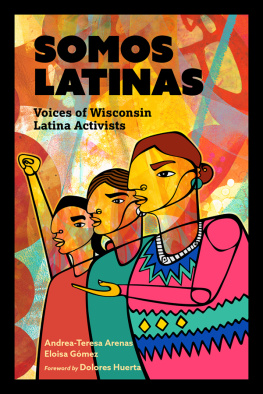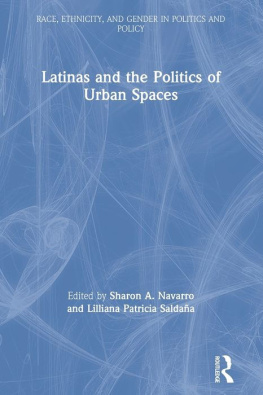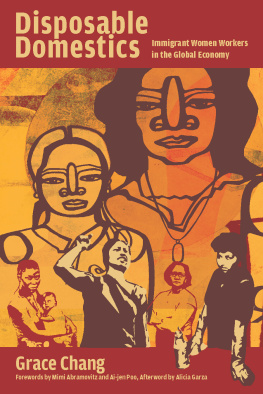Latina Realities
New Directions in Theory and Psychology
Series Editors
Rachel T. Hare-Mustin and Jeanne Marecek
Focusing on emerging theory in psychology and related fields, this scholarly/trade series examines contemporary ideas broadly associated with postmodernism, social constructionism, feminist theory, and other critical reformulations of psychology We seek manuscripts that propose or exemplify new ways of doing psychology, that reconsider foundational assumptions of psychological inquiry and practice, and that offer new approaches to therapy theory and practice. Among the topics considered are the social construction of such categories of difference/hierarchy as gender, race and ethnicity, class, and sexuality; and the politics of knowledge. Of interest as well are works that examine ways in which psychologyas a body of knowledge and a cultural institution replicates or challenges arrangements of power and privilege in society.
Rachel T. Hare-Mustin, Villanova University, and Jeanne Marecek, Swarthmore College, coauthored Making a Difference: Psychology and the Construction of Gender.
Books in This Series
Latina Realities: Essays on Healing, Migration, and Sexuality, Oliva M. Espn
Through the Looking Glass:
Women and Borderline Personality Disorder, Dana Becker
Mens Ways of Being,
edited by Christopher McLean, Maggie Carey, and Cheryl White
Sex Is Not a Natural Act and Other Essays, Leonore Tiefer
Celebrating the Other: A Dialogic Account of Human Nature,
Edward E. Sampson
LATINA
REALITIES
Essays on Healing,
Migration, and Sexuality
Oliva M. Espn
New Directions in Theory and Psychology
First published 1997 by Westview Press
Published 2018 by Routledge
711 Third Avenue, New York, NY 10017, USA
2 Park Square, Milton Park, Abingdon, Oxon OX14 4RN
Routledge is an imprint of the Taylor & Francis Group, an informa business
Copyright 1997 Taylor & Francis
All rights reserved. No part of this book may be reprinted or reproduced or utilised in any form or by any electronic, mechanical, or other means, now known or hereafter invented, including photocopying and recording, or in any information storage or retrieval system, without permission in writing from the publishers.
Notice:
Product or corporate names may be trademarks or registered trademarks, and are used only for identification and explanation without intent to infringe.
A CIP catalog record of this book is available from the Library of Congress.
ISBN 13: 978-0-8133-3234-5 (pbk)
ISBN 13: 978-0-8133-3233-8 (hbk)
Contents
Part 1
Experience as a Source of Theory and Method
Part 2
Feminist Psychology and Psychotherapy
Part 3
Sexuality
Part 4
Immigrant Women and Adolescents
Part 5
The Interplay of Migration and Sexuality in Womens Lives
Foreword:
The Enigma of Arrival
Journey and
Transformation
Lillian Comas-Daz
Latina Realities is a remarkable tapestry depicting womens lives. Oliva Espns inspiring weaving reveals an extraordinarily rich and diverse portrait of women that emphasizes themes of loss, migration, grief, adaptation, oppression, healing, creativity, and identity. Journey is an apt metaphor for the process by which we come to understand the situated knowledge of Latinas. The author shares with us her expert account of Latinas journeys as well as her own odyssey. Emphasizing a narrative approach to womens lives, Oliva Espn documents not only that the personal is political but also that the distinctly personal touches us all.
Latina Realities is a compilation of essays based on Dr. Espns extraordinary work over a sustained period. Her own scholastic journey, influenced by her personal migrations, provides a map for understanding the psychology of women. In her journey, Espn transforms herself into a witness, storyteller, subversive, alchemist, and sibyl. As a witness, she encourages Latinas to break their silence by listening to their testimonies. As a cantadora (storyteller), she inspires women to compose their lives. As a psychologist, she subversively challenges mainstream theory. Aiming at empowerment, her work transforms victims into victors. She rescues traditional wisdom and restores womens sense of dignity. And as an alchemist, Espn searches for the transforming source of knowledge, a search that culminates in the crafting of a multicultural feminist psychology. Along the way, she examines the arcane knowledge of Latina healers, including espiritistas, santeras, and curanderas, such that Latina ways of knowing transform her into a sibyl. Her scholastic prophecies are conjugated with her superb ability to examine, understand, and translate Latinas realities.
Latina Realities acknowledges oppression as a psychological force. It documents a collaborative method of empowering women that is culturally congruent. Aided by the Latino tradition of storytelling, Espns therapeutic stories affirm womens fluid identities. She confronts taboo topics. She reminds us that the sexual behavior of women serves a function beyond the personal, thus addressing the paradox of Latina sexuality as a source of both oppression and power. This collection restores to the self both power and agency, making the unknown known. It is revolutionary as it challenges the rigid patriarchal knowledge that bans women into the otherland. Espns feminist tools help to effectively dismantle the masters house. Indeed, she is one of the true architects of the psychology of liberation.
Please join me in celebrating the publication of this book. Latina Realities significantly advances our knowledge not only of Latinas and women of color but of all women. It offers a model for addressing womens realities. Underlying it is the belief that those who differ from the mainstream have important knowledge to impart: Firsthand knowledge of multiple distinct realities sharpens our perspective and makes us see ourselves and others in a new and creative light. Latina Realities provides insightful wisdom to those who reside in the margins of society as well as to those who enjoy the privilege of being insiders. This book solves the enigma of the arrival; our journeys end in transformation. Latina Realities is about finding ourselves.
This book is a collection of selected pieces of my previously published work. The essays chosen for inclusion address a range of topics crucial to contemporary debates in psychology. The main purpose of this book is to contribute to ongoing debates on the impact of social forces on individual psychological development. These essays emphasize psychologys role as a means of human welfare, focusing on the complexities of the psychological development of immigrant women, Latinas, and other women of color and issues relevant to providing psychological services to them. The essays cover issues of method, sexuality, therapy with Latinas and other women of color, immigrant and refugee women, ethnic-minority and immigrant women of diverse sexual orientations, and theoretical perspectives on feminist psychology and diversity.
During most of my professional career I have been both a faculty member engaged in the training of psychotherapists at the graduate level and a practicing feminist therapist. Since 1990, this combination, which had been central to my professional identity and development, has changed: I have been immersed in the world of womens studies with continuing involvement in psychology. This deeper involvement in womens studies has stimulated my thinking and intellectual growth, yet I remain deeply committed to psychology. In these essays, I speak as a feminist psychologist who has learned as much from practice and teaching as from purely intellectual and research endeavors.









